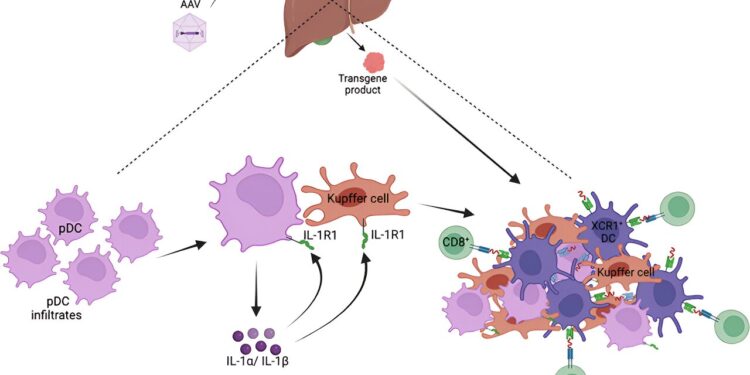Graphical summary. Credit: Molecular therapy (2023). DOI: 10.1016/j.ymthe.2023.11.029
Indiana University School of Medicine researchers have discovered critical information about a liver trigger that blocks an unwanted immune response due to gene therapy, which, surprisingly, results in the activation of immune cells specific despite the typical role of the liver in suppressing immune responses.
The results, published in Molecular therapycould pave the way for a change in immunomodulation strategies to achieve the desired and long-lasting effects of gene therapy.
Gene therapy treatments involve replacing or introducing a healthy copy of the defective gene causing the genetic disease. The process is often accomplished using a viral vector – in this case, a small, harmless virus called adeno-associated virus (AAV), which carries the healthy gene for delivery to the target organ. Unfortunately, a notable challenge in conventional gene therapy approaches is the tendency of the immune system to reject certain treatments.
“Sometimes, gene therapy can cause an adverse immune response when the body misperceives the treatment as a viral threat,” said Roland Herzog, Ph.D., Riley Children’s Foundation professor of immunology at the School of Medicine. from IU and lead author of the study. “Our goal is to explore innovative approaches to gene therapy, seeking methods that provide higher success rates for the benefit of patients.”
The latest research, led by Herzog and Sandeep Kumar, Ph.D. of the Herman B Wells Center for Pediatric Research at the IU School of Medicine, found that certain immune cells, called cytotoxic T lymphocytes, can sometimes be triggered in the liver despite the immunosuppressive properties of the organ.
Surprisingly, and contrary to what was known about these immune mechanisms in response to AAV gene therapy, Kumar discovered that the receptor for a cytokine called interleukin-1 was essential for triggering the response that can lead to immune rejection. Importantly, the team was able to prevent the immune response by blocking this pathway. These results represent an important step towards ensuring more targeted and controlled immune responses.
“Our data showed that while liver-targeted treatments provide a roadmap to safer and more precise gene therapy options, additional immunomodulation strategies may be needed for long-term therapeutic benefit,” said Kumar, first author of the study and research assistant professor of pediatrics. at the IU School of Medicine.
The study’s implications extend beyond liver gene therapy, as the group’s findings offer a promising direction for future clinical applications that could benefit several genetic diseases.
“The concept of preserving gene therapies by blocking certain immune responses can be applied to many genetic diseases like hemophilia, lysosomal storage disorders and metabolic diseases,” Herzog said. “This advance is incredibly promising for this field, and we look forward to its broad adaptation to clinical trials, drugs, and gene therapy protocols.”
More information:
Sandeep RP Kumar et al, TLR9-independent CD8+ T cell responses in hepatic AAV gene transfer via IL-1R1-MyD88 signaling, Molecular therapy (2023). DOI: 10.1016/j.ymthe.2023.11.029
Provided by Indiana University School of Medicine
Quote: Researchers reveal unexplored liver-driven pathway in gene therapy immune responses (December 7, 2023) retrieved December 7, 2023 from
This document is subject to copyright. Apart from fair use for private study or research purposes, no part may be reproduced without written permission. The content is provided for information only.



